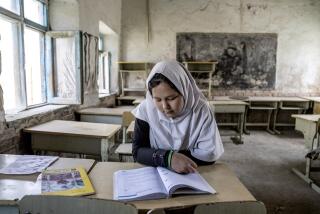Pakistani Government Will Attempt to Rein In Militant Religious Schools
- Share via
RAWALPINDI, Pakistan — President Pervez Musharraf’s military government is expected to implement a law within the next few days to regulate the country’s controversial Islamic religious schools, whose increasingly militant, anti-Western teachings have influenced a generation of young men.
But the law has already met such strong resistance from religious leaders that effective enforcement remains far from certain.
“Enforcement is the million-dollar question,” said Religious Affairs Minister Mahmood Ghazi.
The ordinance, approved in principle last week by Musharraf’s Cabinet after months of preparation, requires each of the estimated 8,000 to 10,000 Muslim schools in the country--known as madrasas--to register within six months with federal and provincial authorities.
Registration is viewed as a first step toward curtailing the teaching of what has become an increasingly extreme brand of Islam.
In addition to ordering punishments of up to two years in prison for Muslim clerics who use the madrasas to preach militancy and sectarian hatred, the ordinance requires the schools to broaden their curricula to include math, general science, English and social studies.
Up to 1.5 million students will be affected, Ghazi said.
The law is the latest in a series of measures taken by Musharraf to weaken the influence of religious extremists in the country. Many in the West--and in Musharraf’s government--came to see the madrasas as incubators of the virulent anti-Americanism and strong sympathies for Muslim militancy that were visible in Pakistan during the days after Sept. 11.
But many madrasa administrators and teachers view the reform efforts with suspicion. They insist that the problems are exaggerated by what they characterize as outside interests working to undercut Muslims. Musharraf’s government, they say, has simply buckled under to Western influence.
“You only reform what is bad, and madrasas are not bad,” said Shafiq Julludhari, head of the Jamia Muhammadi Madrasa in this bustling city in Punjab province. Like many of the madrasa leaders in Pakistan, Julludhari is a follower of the conservative Deoband school of Islam.
“There is more violence in the [state] educational institutions and universities than in madrasas,” he added.
Under terms of the ordinance, foreign donations to the madrasas will require government approval and foreigners studying in them will need to register with the government and possess student visas.
Madrasas are as old as Islam itself, but their number has grown rapidly in Pakistan over the last two decades, spurred by the religious fervor connected with resistance to the Soviet Union’s invasion of neighboring Afghanistan.
At the time, the United States encouraged this fervor as a way to weaken its Cold War enemy.
Arab world money, much of it from arch-fundamentalist donor groups, also flowed in and helped harden--and narrow--the message conveyed in the madrasas. In many, the curriculum was gradually reduced to memorizing the Koran in its original Arabic, a language that few Pakistani students understand, and then putting extreme interpretations on the words.
Because the madrasas are boarding schools that offer not just free education but also free room and board, they are often the only schooling option for boys from poor families.
Largely isolated from the world, students are in effect shut off from all but the hard-line brand of Islam that the resident clerics frequently season with anti-Americanism and tales of Western decadence.
Members of the archconservative Taliban, who were themselves products of Pakistan’s madrasas, quickly became role models for these young and impressionable students after they came to power in Afghanistan in the mid-1990s.
Rather than imposing the new controls on the schools’ leaders, Ghazi said, he is trying to sell them on the idea as a way to improve the quality of education offered.
“There’s some elements of persuasion,” he said, “and some elements of coercion.
“The transformation must be gradual,” he added. “We’re trying to introduce new books and new teachers for the secular syllabus.”
But with Pakistan’s state-run educational system woefully underfinanced and staffed by low-paid teachers who frequently show little motivation, simply finding good people for the madrasas won’t be easy. Ghazi said the government hopes to hire state-school teachers for part-time work.
At the same time, those now teaching in the madrasas will be paid “token amounts” to undergo retraining at several of the country’s teaching colleges.
So far, Ghazi said, the clerics have agreed to introduce the basic secular subjects as mandatory through the 10th grade. He said that three model madrasas will be established under federal control and that four administered by the North-West Frontier provincial government have begun operating.
But as Ghazi noted, enforcing the provisions against incitement won’t be easy, even if clerics are won over.
As interviews with religious leaders make clear, even defining what constitutes extremist teachings is highly debatable. For example, Mohammed Kamal, the head of the Rawalpindi branch of the Jamaat-i-Islami religious party, said that teaching contempt for the U.S. isn’t extremist. It is an obligation, deduced by simple logic.
“When [our teachers] see Americans supporting those who kill Muslims around the world--in Palestine, in India--they develop a hatred,” he said. “So they teach students that Americans are against their religion and so they should fight against them.”
More to Read
Sign up for Essential California
The most important California stories and recommendations in your inbox every morning.
You may occasionally receive promotional content from the Los Angeles Times.













